Chapter Three: Court Martial Proceedings: Year in Review
The information and analysis provided below reflects the operations of the CMPS pertaining to pre-charge advice, referrals, post-charge reviews, courts martial, and custody review hearings over the course of the reporting period.
Overview
The CMPS’s total court martial caseload for the reporting period consisted of 123 files: 76 referrals were received during the reporting period and 47 files were carried over from the previous reporting period.
In addition, the CMPS handled 87 requests for pre-charge advice, 16 appeals to the CMAC and one (1) appeal to the SCC, for a total of 227 files over the course of the current reporting period (pre-charge, referral and appeal files combined).
Military judges are, in certain circumstances, required to review orders made to retain a CAF member in service custody. The DMP represents the CAF at all such hearings. One pre-trial custody review hearing was conducted during this reporting period and the member was released with conditions. Please refer to Annex D for an overview of the disposition of this custody review hearing.
Finally, a total of 34 courts martial were completed. Two (2) of those were new trials following appeals and orders made by the CMAC for the conduct of new courts martial: R v LS Edwards and R v Cpl Thibault.
The COVID-19 Pandemic
The COVID-19 pandemic presented prosecution services across Canada with unprecedented challenges and limitations on bringing matters before the courts. While the CMPS was not spared, it was able to quickly adapt to the new reality of prosecuting cases in the pandemic environment and has proven itself to be operationally focused and responsive. Courts martial, including those involving a panel, have proceeded safely and efficiently, sometimes virtually where necessary, to fulfil the requirement that our prosecutors be globally deployable in any environment. Under CMPS leadership, the entire team met regularly to discuss ongoing matters, engage with the chain of command and victims, and conducted weekly training sessions to ensure that the interest of justice and discipline were advanced. Successfully prosecuting cases in the new COVID-19 environment has demonstrated that the CMPS is a small, but highly adaptable and agile component of the military justice system which can achieve desired outcomes in any environment.
Pre-Charge Advice
RMPs within the CMPS are responsible to provide pre-charge advice to both the CFNISFootnote 18 and to unit legal advisors.Footnote 19 In this reporting period, 82 requests for pre-charge advice were sent to the CMPS and 5 requests had been pending from the previous reporting period. Of the 87 total requests, 71 pre-charge advice files were completed during this reporting period, leaving 16 files still pending at the end of the current reporting period.
The number of completed pre-charge advice files is lower than the average number of completed files over the past four reporting periods (118). It is likely that the pandemic had a direct impact on the number of requests for advice received by CMPS during the reporting period. It is anticipated that as pandemic restrictions subside, and the Canadian Armed Forces returns to normal operational activities, the number of requests for pre-charge advice will increase in the next reporting year.
Figure 3-1 shows the number of completed pre-charge files for the last five reporting periods.
Figure 3-1: Number of Completed Pre-Charge Files by Reporting Period

Figure 3-1: Number of Completed Pre-Charge Files by Reporting Period - Graph breakdown
| 2016/17 | 2017/18 | 2018/19 | 2019/20 | 2020/21 | |
|---|---|---|---|---|---|
| Completed Pre-Charge Files | 93 | 126 | 131 | 122 | 71 |
Referrals and Post-Charge Reviews
Number of Referrals Received During the Reporting Period
During this reporting period, 76 referrals were received by the DMP. This number represents the same number of cases referred to the DMP during the last reporting period.
Caseload for the Reporting Period
When combined with the 47 files that were carried over from the previous reporting period, the caseload for this reporting period was 123 files.Footnote 20
Figure 3-2 shows the number of files handled for the past five reporting periods.
Figure 3-2: Caseload by Reporting Period
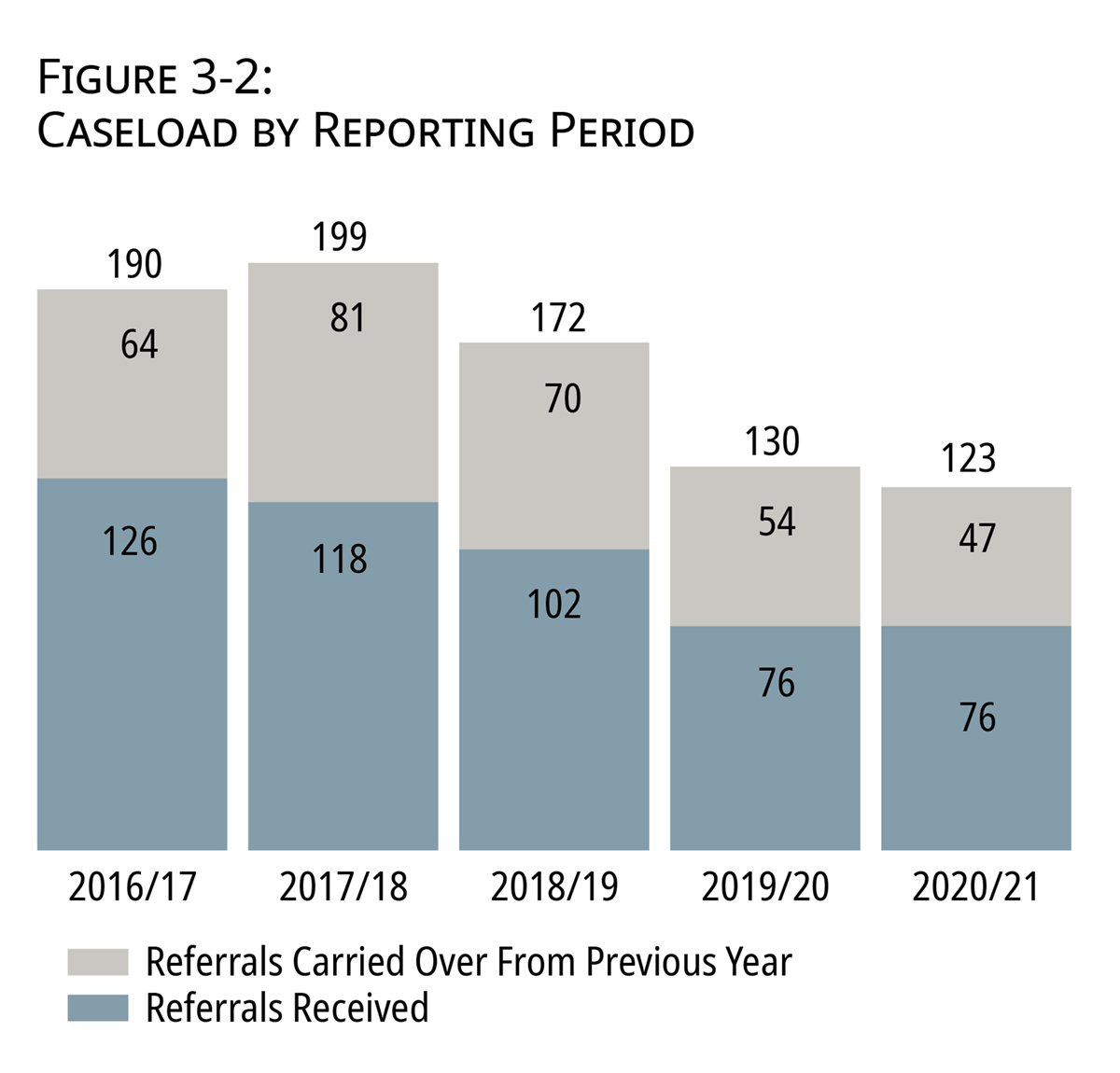
Figure 3-2: Caseload by Reporting Period - Graph breakdown
| 2016/17 | 2017/18 | 2018/19 | 2019/20 | 2020/21 | |
|---|---|---|---|---|---|
| Referrals Carried Over From Previous Year | 64 | 81 | 70 | 54 | 47 |
| Referrals Received | 126 | 118 | 102 | 76 | 76 |
| Total | 190 | 199 | 172 | 130 | 123 |
Preferrals, Non-Preferrals and Referral of charge to unit for summary trial
During this reporting period, post-charge decisions were made by an RMP in 76 files, while eleven (11) files were still pending a prosecutorial decision at the end of the current reporting period.
Of the 76 completed files, 55 files led to one or more charge being preferred for court martial, 15 files were not preferred and 6 files were referred back to the originating unit to try the accused person by summary trial. The preferral rate for this reporting period is 72%.
Figure 3-3 shows the number of preferrals, non-preferrals and referral of charge to unit for summary trial for the past five reporting periods.Footnote 21
Figure 3-3: Number of Preferrals and Non-Preferrals by Reporting Period
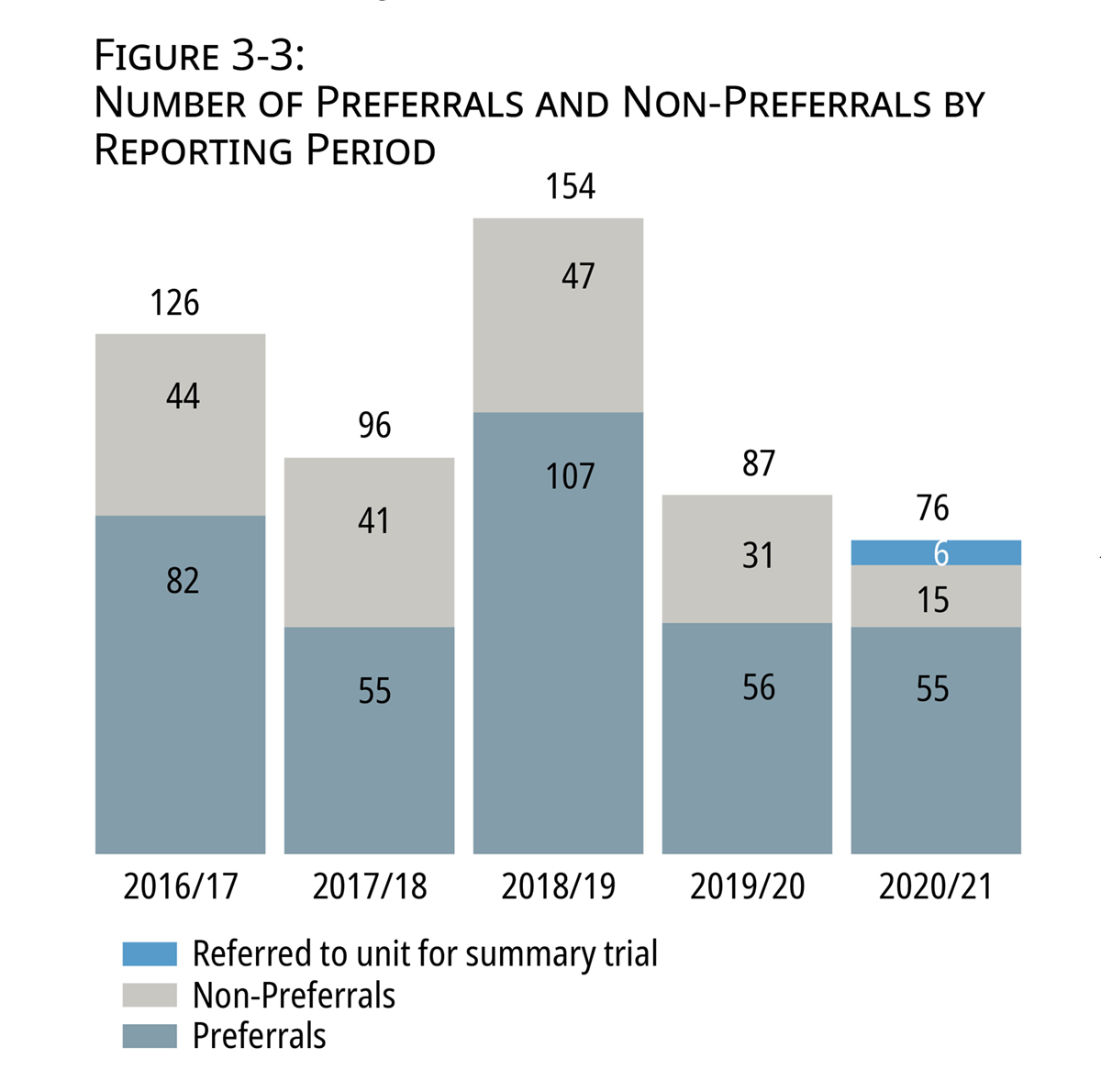
Figure 3-3: Number of Preferrals and Non-Preferrals by Reporting Period - Graph breakdown
| 2016/17 | 2017/18 | 2018/19 | 2019/20 | 2020/21 | |
|---|---|---|---|---|---|
| Referral to unit for summary trial | 6 | ||||
| Non-Preferrals | 44 | 41 | 47 | 31 | 15 |
| Preferrals |
82 | 55 | 107 | 56 | 55 |
| Total | 126 | 96 | 154 | 87 | 76 |
Time to Make a Prosecutorial Decision
The average number of days from the time a file was referred to the DMP until a RMP made a post-charge decision was approximately 81 days.Footnote 22; This represents an increase of 11 days from the previous reporting period. It is also below the average number of days for the past five reporting periods, which is 85 days.
Figure 3-4 illustrates the average number of days from referral to a post-charge decision for the past five reporting periods.
Figure 3-4: Average Number of Days from Referral to Post-Charge Decision by Reporting Period
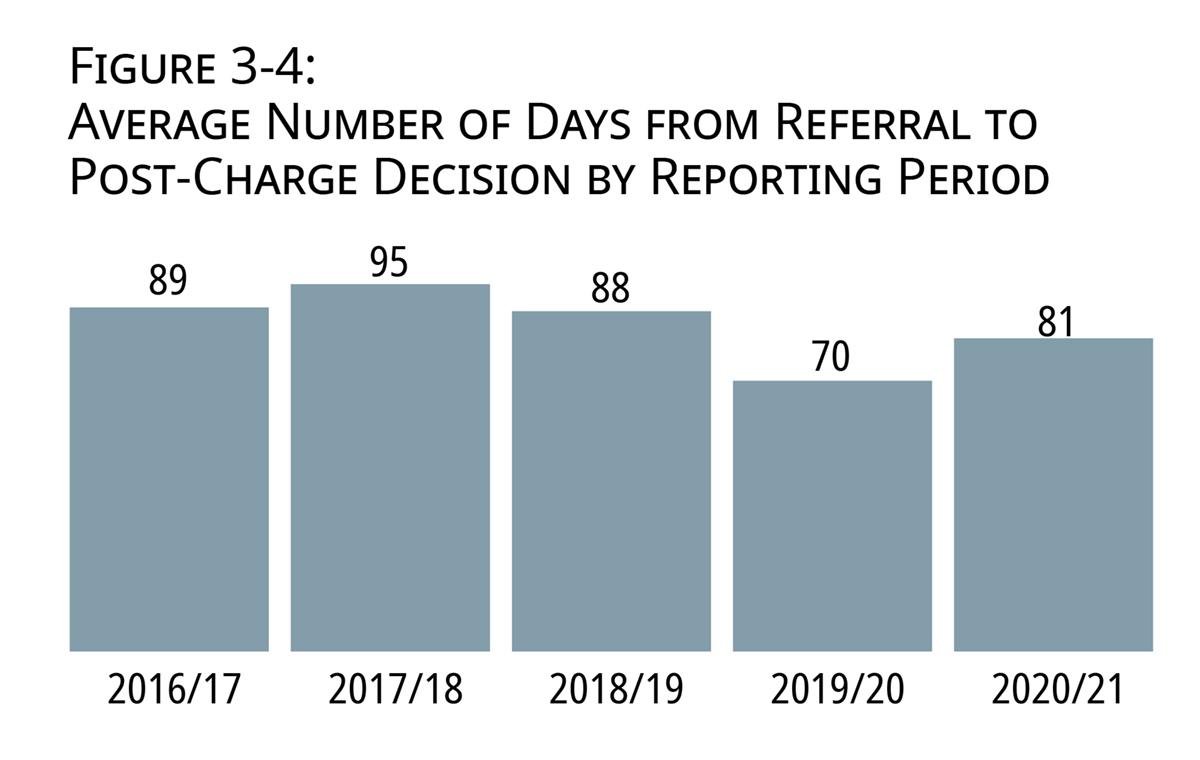
Figure 3-4: Average Number of Days from Referral to Post-Charge Decision by Reporting Period - Graph breakdown
| 2016/17 | 2017/18 | 2018/19 | 2019/20 | 2020/21 | |
|---|---|---|---|---|---|
| Days | 89 | 95 | 88 | 70 | 81 |
Preferral Rates by Investigative Agency
Although all files referred to the DMP are received through a referral authority, the incident giving rise to the charge may be investigated by one of three military investigative agencies: the CFNIS, an investigator with the military police who is not a member of the CFNIS, or a unit investigator. As such, the rate of preferrals varies between investigative agencies as their investigators have different levels of experience, proficiency and training.
During this reporting period, the preferral rate for those files investigated by the CFNIS was 96%. This preferral rate is slightly higher than that of the regular military police (95%), but is markedly higher than that of unit investigators (46%).
This divergence of preferral rates has been consistent over the past several years, with those investigations conducted by the CFNIS being preferred at a higher rate than unit investigators. However, the preferral rates by military police has increased significantly when compared to previous reported periods.
The DMP has identified the discrepancy in preferral rates, and in particular the low preferral rate of unit investigations, as an issue and has taken a number of steps to improve the preferral rates of investigative agencies. For example, in the past reporting period, the CMPS amended a number of its policy directives to require RMPs to provide feedback to the investigator both when there is a decision not to prefer a charge and also at the conclusion of a court martial, with the aim of improving the quality of future investigations. The DMP also provided two RMP’s to attend and assist with the CFMPA Military Police Investigators Course, conducted in Borden in October 2020.
For a complete overview of preferral rates by investigative agency over the past five reporting periods, please refer to Figure 3-5.
Figure 3-5: Preferral Rates by Investigative Agency and by Reporting Period

Figure 3-5: Preferral Rates by Investigative Agency and by Reporting Period - Graph breakdown
| 2016/17 | 2017/18 | 2018/19 | 2019/20 | 2020/21 | |
|---|---|---|---|---|---|
| CFNIS | 90 | 100 | 94 | 79 | 96 |
| Military Police |
66 | 53 | 75 | 77 | 95 |
| Unit | 54 | 37 | 53 | 46 | 46 |
Courts Martial
This section provides an overview and analysis of cases heard at a court martial during the reporting period. For a complete list of all courts martial heard during the reporting period, please refer to Annex A.
Number of Courts Martial
A total of 34 courts martial were completed during this reporting period. Of those, 27 were SCMs and 7 were GCMs. This number is lower than the historical average of courts martial for the past five years (52).
This difference is due to the fact that the Court Martial Administrator, acting on direction from the Chief Military Judge and the Acting Chief Military Judge, canceled convening orders for courts martial that were scheduled from 16 March to 31 May 2020.
Figure 3-6: Number of Courts Martial by Type and by Reporting Period
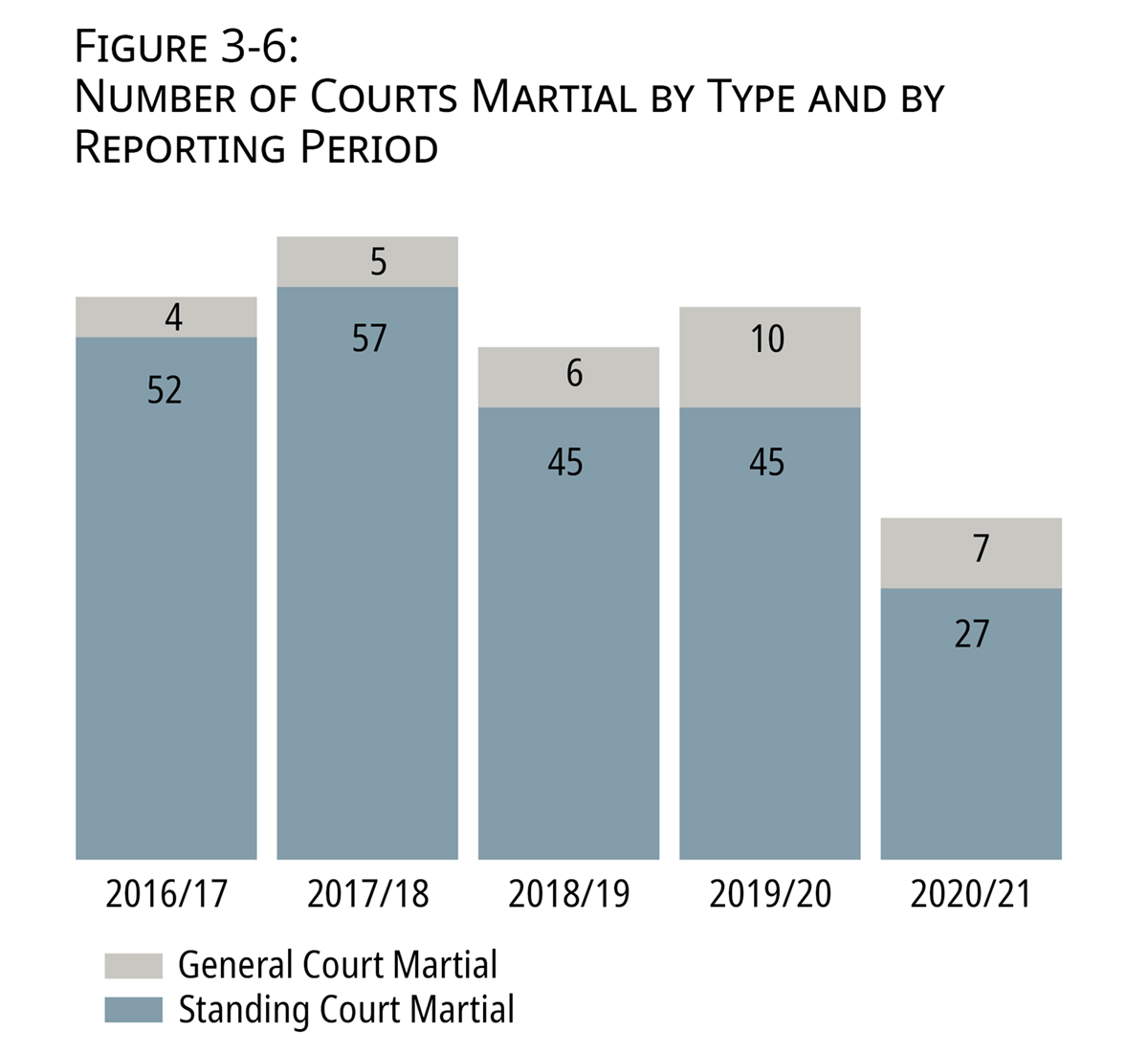
Figure 3-6: Number of Courts Martial by Type and by Reporting Period - Graph breakdown
| 2016/17 | 2017/18 | 2018/19 | 2019/20 | 2020/21 | |
|---|---|---|---|---|---|
| General Court Martial | 4 | 5 | 6 | 10 | 7 |
| Standing Court Martial | 52 | 57 | 45 | 45 | 27 |
Court Martial Outcomes
Of the 34 courts martial that were held, accused persons were found guilty of one or more charges in 25 cases, had all charges withdrawn in one (1) case,Footnote 23 had a stay of proceedings in seven (7) and had a termination of proceedings in one (1) case.
In addition, two (2) of the 34 courts martial were new trials following appeals and orders made by the CMAC for the conduct of a new court martial: R v LS Edwards and R v Cpl Thibault. In R v Cpl Thibault, the accused was found guilty following a new court martial while a stay of proceeding was ordered in R v LS Edwards.
Figure 3-7 shows a breakdown of court martial outcomes for the last five reporting periods.
Figure 3-7: Courts Martial Outcomes by Reporting Period
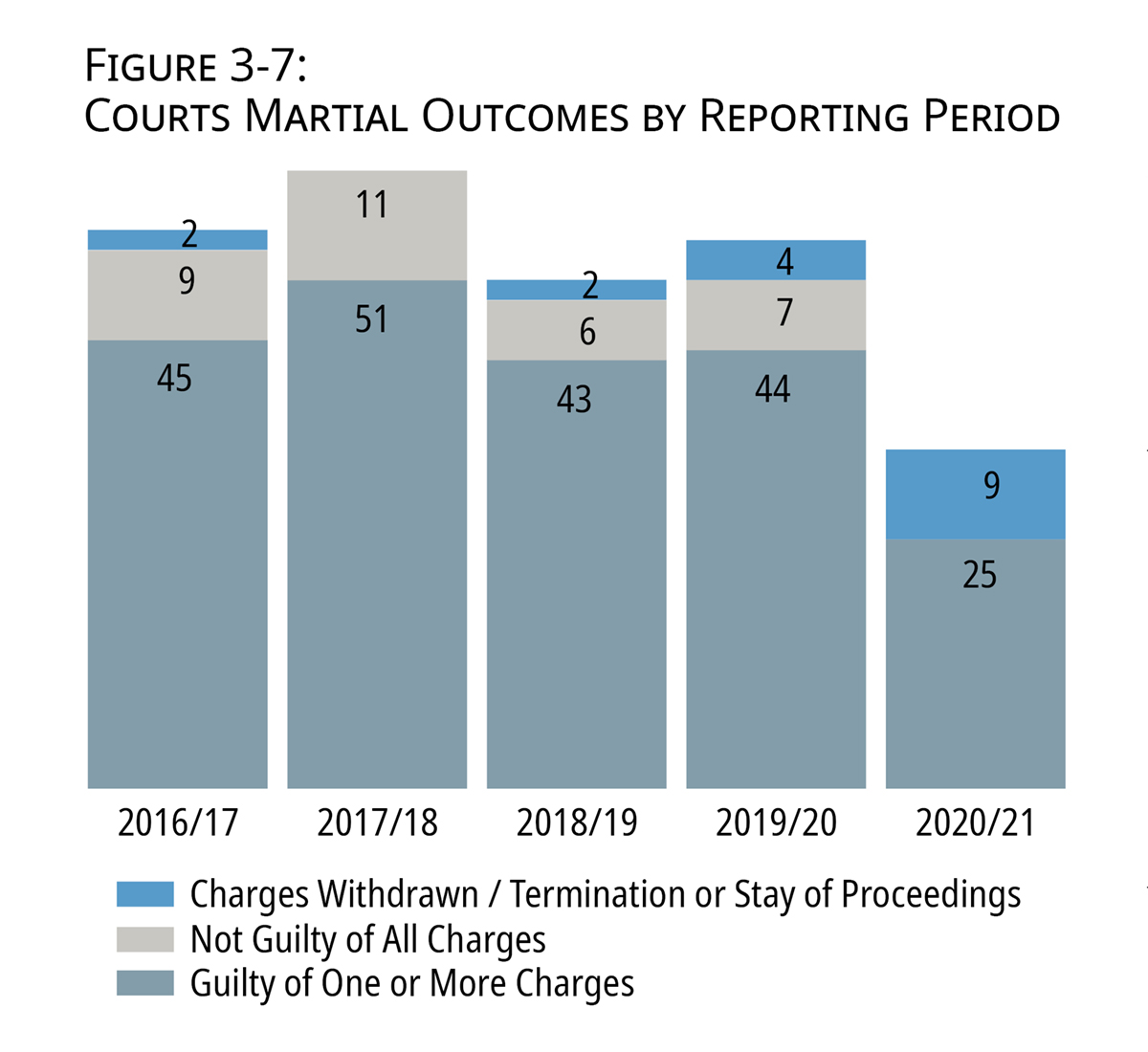
Figure 3-7: Courts Martial Outcomes by Reporting Period - Graph breakdown
| 2016/17 | 2017/18 | 2018/19 | 2019/20 | 2020/21 | |
|---|---|---|---|---|---|
| Charges Withdrawn / Termination or Stay of Proceedings | 2 | 0 | 2 | 4 | 9 |
| Not Guilty of All Charges | 9 | 11 | 6 | 7 | 0 |
| Guilty of One or More Charges | 45 | 51 | 43 | 44 | 25 |
Punishments at Courts Martial
In this reporting period, a total of 25 sentences were handed down by courts martial, involving a total of 37 punishments. While only one sentence may be given at a court martial, a sentence may involve a combination of more than one punishment.
Again this year, the most common punishment awarded at courts martial was a fine, with a total of 20 fines awarded representing 54% of all punishments. The next most common punishment awarded was a severe reprimand, which accounted for approximately 8% of all punishments. Three (3) custodial punishments were awarded.
A complete breakdown of all punishments imposed at courts martial for the last five reporting periods can be found in Table 3-1.
Table 3-1: Punishments at Court Martial
| Punishment | 2016/17 | 2017/18 | 2018/19 | 2019/20 | 2020/21 |
|---|---|---|---|---|---|
| Dismissal | 1 | 3 | 2 | 1 | 0 |
| Imprisonment | 4 | 7 | 3 | 2**** | 3 |
| Detention | 4* | 4** | 1*** | 1***** | 0 |
| Reduction in Rank | 9 | 9 | 2 | 3 | 4 |
| Forfeiture of Seniority | 0 | 0 | 0 | 1 | 0 |
| Severe Reprimand | 6 | 11 | 9 | 15 | 5 |
| Reprimand | 17 | 20 | 4 | 6 | 3 |
| Fine | 39 | 38 | 35 | 32 | 20 |
| Minor Punishments | 0 | 3 | 0 | 0 | 2 |
| Absolute Discharge****** | N/A | N/A | 0 | 2 | 0 |
| Total | 80 | 95 | 56 | 63 | 37 |
* One of these punishments was suspended by the presiding military judge.
** Three of these punishments were suspended by the presiding military judge.
*** This punishment was suspended by the presiding military judge.
**** One of these punishments was suspended by the presiding military judge.
***** This punishment was suspended by the presiding military judge.
******Absolute discharges became available to presiding military judges as of 1 September 2018 under section 203.8 of the NDA.
Time from Preferral of Charge(s) until Commencement of Court Martial
During this reporting period, the average number of days from the preferral of charge(s) until the commencement of the court martial was 232 days.Footnote 24 This is an decrease of 46 days in comparison to the previous reporting period and is 12 days above the past five year average of 244 days.
Figure 3-8 shows the average number of days from the preferral of charges until the commencement of the court martial for the last five reporting periods.
Figure 3-8: Average Number of Days from Preferral to Commencement of Court Martial by Reporting Period
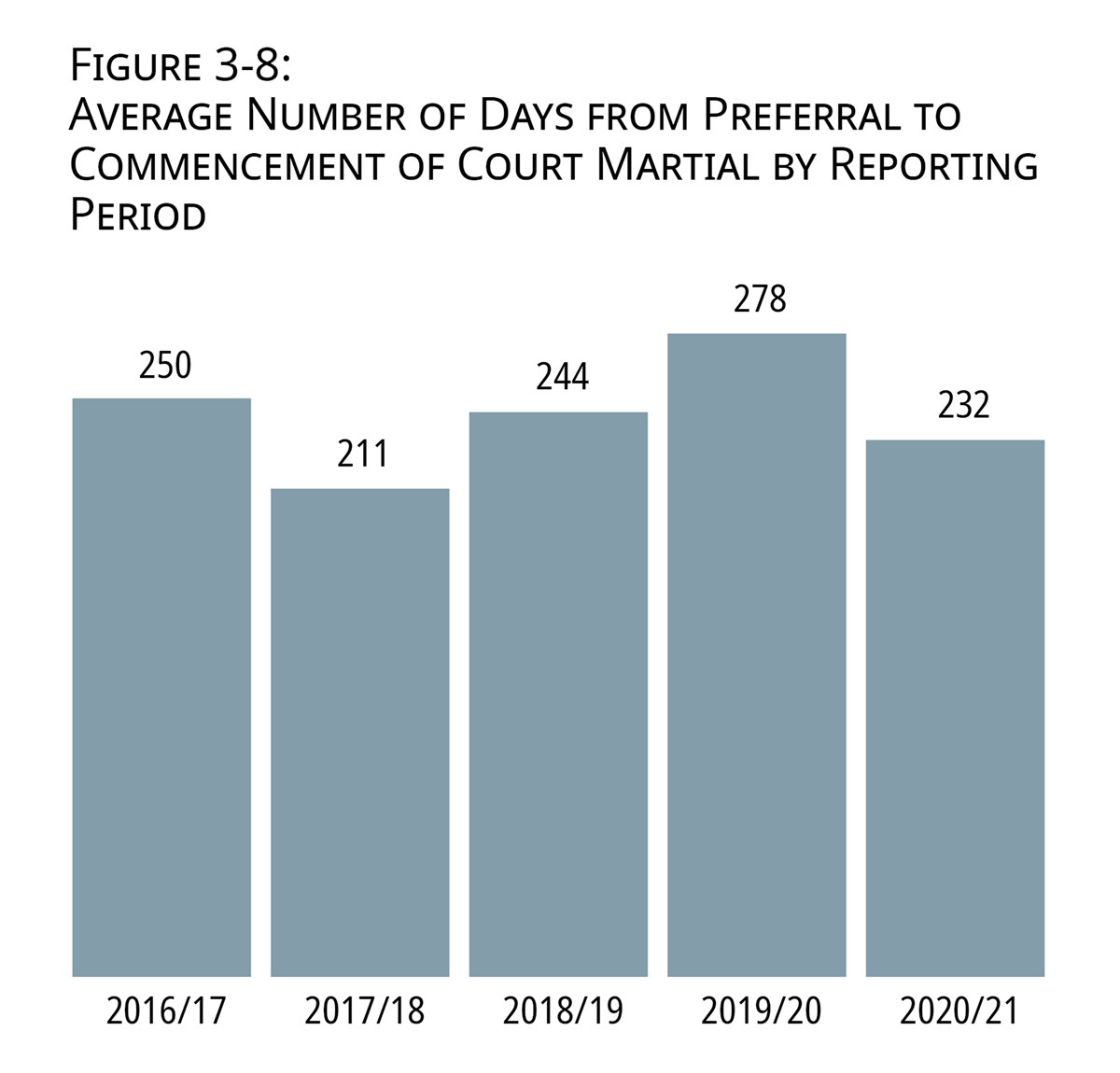
Figure 3-8: Average Number of Days from Preferral to Commencement of Court Martial by Reporting Period - Graph breakdown
| 2016/17 | 2017/18 | 2018/19 | 2019/20 | 2020/21 | |
|---|---|---|---|---|---|
| Days | 250 | 211 | 244 | 278 | 232 |
Offence Categories
All files prosecuted by the DMP are categorized into one of four broad offence categories: sexual misconduct, alcohol and drugs, conduct offences and fraud and other property-related offences. Table 3-2 provides an overview of the number of completed courts martial for each offence category.
Table 3-2: Courts Martial by Offence Category
| Offence Category | Completed Courts Martial 2016-17 | Completed Courts Martial 2017-18 | Completed Courts Martial 2018-19 | Completed Courts Martial 2019-20 | Completed Courts Martial 2020-21 |
|---|---|---|---|---|---|
| Sexual Misconduct | 21 | 20 | 20 | 25 | 14 |
| Alcohol and Drugs | 7 | 2 | 5 | 1 | 3 |
| Conduct | 21 | 34 | 21 | 20 | 13 |
| Fraud and Property | 8 | 6 | 5 | 9 | 4 |
| Total | 57Footnote 25 | 62 | 51 | 55Footnote 26 | 34 |
Notable Court Martial Cases
This section provides a summary of three notable courts martial that were held during this reporting period. Please refer to Annex A for an overview of all the courts martial held during this reporting period.
R v Thibault, 2020 CM 5005
Sergeant Thibault was originally charged in 2014 with one count of an offence contrary to the section 130 of the NDA, that is, sexual assault, contrary to section 271 of the Criminal Code. This court martial was a new trial following appeals that proceeded to the SCC. After the decision in R v Stillman, 2019 SCC 40, the new trial order made by the CMAC in 2017 was reinstated.
On 18 February 2020, Sergeant Thibault was convicted. The defence requested an adjournment to obtain a pre-sentencing report for the purposes of the sentencing hearing. In March 2020, the COVID-19 pandemic caused further delays to the sentencing hearing. In the intervening time, Sergeant Thibault changed counsel and filed an application alleging a breach of his right to be tried by a fair and independent tribunal protected under section 11d) of the Charter and a motion for recusal. Before the hearing on these applications could be held, Sergeant Thibault also filed an application for judicial review and a motion for a provisional writ of prohibition at the Federal Court, seeking to preclude the presiding military judge to decide on the motion for recusal and to order the designation of another military judge to preside over his court martial.
On 14 December 2020, in the decision Thibault c Canada (Directeur des poursuites militaires), 2020 CF 1154, the Federal Court denied Sergeant Thibault’s motion for a writ of prohibition. On 21 December 2020, the presiding military judge heard the motion for recusal and the DMP’s motion to quash the Charter application. On 3 February 2021, Sergeant Thibault withdrew his application for judicial review at the Federal Court. On 12 January 2021, Sergeant Thibault filed a motion to adduce new evidence as part of the motion for recusal, which was denied on 20 January 2021. Finally, on 27 January 2021, the presiding military judge denied the motion for recusal and quashed the application alleging a breach of Sergeant Thibault’s rights protected under section 11d) of the Charter.
On 26 February 2021, Sergeant Thibault was sentenced to imprisonment for a term of 18 months, but was released pending appeal. On 29 March 2021, Sergeant Thibault filed a notice of appeal to the CMAC.
R v Lévesque, (citation not yet available)
Sergeant Lévesque was charged with ten offences for incidents that took place while he was deployed as part of a military operation in Senegal. These incidents involved pointing his service weapon towards children; uttering threats towards his subordinates; dangerous driving of a military vehicle; mischief; and uttering racist and sexualized comments about the local population.
He pleaded guilty to 4 counts: one for having pointed a firearm at another person under section 130 of the NDA contrary to section 87 of the Criminal Code; one count of having driven a vehicle of the Canadian Forces in a dangerous manner under section 111 of the NDA; and two counts of conduct to the prejudice of good order and discipline under section 129 of the NDA. As part of the resolution, the other six counts were withdrawn.
A sentencing hearing took place at the Valcartier Garrison (Québec) from 2 to 6 November 2020. An expert witness testified as to the impact a custody sentence would have on the mental health of Sergeant Lévesque. While she did recognize that rehabilitation was an important factor, the military judge felt that the principles of denunciation and deterrence, in this case, required a custodial sentence.
Sergeant Lévesque was sentenced to three months of imprisonment in military prison and a reduction in rank to corporal. He appealed the legality of the sentence as it pertains to the location of his imprisonment.
R v Duquette, 2019 CM 3016
Major Duquette was charged under section 130 of the NDA for sexual assault contrary to section 271 of the Criminal Code; under section 129 of the NDA for conduct prejudicial to good order and discipline for sexual harassment; and for ill-treating a person that was subordinate to him under section 95 of the NDA.
The incidents took place in CFB Bagotville during a Christmas party. On the dance floor, Major Duquette touched the buttocks of his subordinate without her consent while rubbing his torso on hers. He also whispered sexualized comments in her ears. The scene was observed by two civilian witnesses.
Following his trial, which took place in November 2019, he was found guilty on all counts.
Because of the pandemic, the sentencing hearing only took place in June of 2020. After a contested hearing, Major Duquette was sentenced to a reduction in rank to Captain. It was also ordered he be registered on the sex offender registry for 10 years and that a sample of his DNA be collected.
Captain Duquette appealed this decision and it will be heard by the CMAC on 29 June 2021.
Appeals
This section provides an overview of those cases which were appealed to the CMAC as well as to the SCC. Please refer to Annex B for an overview of the disposition of cases appealed to the CMAC and to Annex C for those cases referred to the SCC.
Decisions Rendered by the CMAC
R v Banting, 2020 CMAC 2
On 7 November 2019, Lieutenant Banting filed a motion seeking costs at trial and on appeal, on a solicitor-client basis. The total amount claimed was $61,155.00. The motion followed the decision of the Court, rendered on 6 November 2019, to dismiss DMP’s appeal of the no prima facie determination made by the military judge at trial, who found that there was no evidence of prejudice to good order and discipline.
On 22 April 2020, party-and-party costs in the amount of $10,000 were awarded by the CMAC after a determination that the Respondent should not bear the costs of what the CMAC referred to as a test case with major implications across the whole of the military justice system pertaining to what constitutes prejudice to good order and discipline.
R v Duquette, 2020 CMAC 4
On 23 November 2019, a military judge found Major Duquette guilty of sexual assault under section 130 of the NDA (contrary to section 271 of the Criminal Code), of conduct to the prejudice of good order and discipline contrary to section 129 of the NDA, and of ill treatment of a person who by reason of rank was subordinate to him contrary to section 95 of the NDA.
The military judge imposed a sentence of reduction in rank to the rank of captain and ordered his registration on the sex offender registry. Captain Duquette appealed the legality of the findings of guilty and of the sentence imposed on him on 26 June 2020. He also filed an application on 23 July 2020, requesting a stay of execution of the reduction in rank pending appeal.
On 29 October 2020, the Court dismissed Captain Duquette’s motion for a stay of execution of the sentence pending appeal. The appeal is scheduled to be heard on 29 June 2021.
R v Renaud, 2020 CMAC 5
Captain Renaud was charged with five offences and was found guilty by the SCM of two counts (fourth and fifth counts on the charge sheet) of conduct to the prejudice of good order and discipline, contrary to section 129 of the NDA, for inappropriate sexualized comments made during his deployment on Operation REASSURANCE in Romania. He was sentenced to a severe reprimand and a fine in the amount of $2,500.
Captain Renaud appealed the legality of the military judge’s findings on both counts of conduct to the prejudice of good order and discipline.
In relation to the fourth count, the Court held that the issue was purely one of fact and that the military judge did not err and considered the entirety of the evidence. On the fifth count, the Court confirmed that the military judge had correctly applied the principles previously set out in R v Golzari, 2017 CMAC 3 and Canada v Bannister, 2019 CMAC 2 pertaining to the proof of prejudice to good order and discipline.
R v Duquette, 2020 CMAC 6; 2020 CMAC 7
The Court, having initially dismissed a motion for an extension of time within which to serve and file the Appellant’s Memorandum of Fact and Law after Captain Duquette had failed to meet the deadline imposed by the CMAC rules, reinstated the appeal on 10 December 2020 after receiving a motion to reconsider from the Appellant. The hearing of the appeal is set for 29 June 2021.
R v McGregor, 2020 CMAC 8
Following an SCM, Corporal McGregor was found guilty of sexual assault under section 130 of the NDA (contrary to section 271 of the Criminal Code); two counts of voyeurism under section 130 of the NDA (contrary to section 162(1) of the Criminal Code); one count of possession of a device for surreptitious interception of private communications under section 130 of the NDA (contrary to section 191(1) of the Criminal Code); one count of cruel or disgraceful conduct, contrary to section 93 of the NDA; and, one count of conduct to the prejudice of good order and discipline, contrary to section 129 of the NDA. He was sentenced to imprisonment for a period of 36 months and dismissal with disgrace from Her Majesty’s service.
At trial, Corporal McGregor made an application pertaining to the extraterritorial application of the Charter, alleging that the search of his home in Virginia, USA and the subsequent seizure and search of electronics was unlawful, in breach of section 8 of the Charter. This was dismissed by the military judge after a contested hearing on 13 September 2018. The evidence seized was admitted in evidence.
Corporal McGregor appealed the legality of the finding concerning his application under section 8 of the Charter.
The appeal was heard on 26 June 2020. The Court, on the basis of the previous decision of the SCC in R v Hape, 2017 SCC 26, held that the Charter did not apply in this case as the issuance and execution of the search warrant in Virginia was an exercise of American sovereign authority. The Court further stated that this does not end the matter as the trial judge retains the residual discretion to exclude evidence that would render a Canadian trial unfair. However, in this case, the Court found that the search was properly authorized under Virginia law, including for the search and seizure of electronic devices, that it was conducted reasonably and that it would have been in compliance with Charter standards had the search been wholly conducted in Canada under Canadian warrants.
Corporal McGregor is seeking leave to appeal to the SCC.
R v Champion, 2021 CMAC 1
Sailor third class Champion was arrested for drunkenness on 13 November 2020 and released on conditions by his unit Custody Review Officer (CRO) the following day. On 15 November 2020, Sailor third class Champion was arrested again for breach of conditions. This time, the CRO decided not to release him and Sailor third class Champion was taken before a military judge for a Custody Review Hearing on 17 November 2020. At the hearing, and despite the fact that no charges had been laid, the military judge ordered the release of Sailor third class Champion but chose to impose conditions aimed at insuring that Sailor third class Champion would remain under military authority and report for duty as required.
On 23 November 2020, Sailor third class Champion applied to the CMAC under paragraph 159.9(1) NDA for a review of the military judge’s direction to release with conditions. On the same day, Sailor third class Champion was charged with one count of absence without leave contrary to section 90 of the NDA and one count of drunkenness contrary to section 97 of the NDA. On 24 November 2020, Sailor third class Champion’s Commanding Officer decided not to proceed with the charges and, as a result, all conditions imposed were cancelled in accordance with article 105.303(1)(a) of the Queen’s Regulations and Orders for the Canadian Forces (QR&O).
On 19 February 2021, the Court decided to hear the application despite its mootness to consider the law applicable on whether it is open to a military judge to impose conditions upon release in instances where the member has not yet been charged.
Appeals Initiated at the CMAC
R v Edwards et al, CMAC-606, 607, 608 and 609
The DMP appealed decisions rendered by military judges holding that the right to be tried by an independent and impartial tribunal under section 11(d) of the Charter was breached by an order issued by the Chief of the defence staff (CDS) designating a commanding officer for matters of discipline involving military judges (CDS Order, Designation of Commanding Officers with respect to officers and non-commissioned members on the strength of the Office of the Chief Military Judge DEPT ID 3763, 19 January 2018), and subsequently by the Canadian Forces Organization Order 3763 (Canadian Forces Organization Order 3763 Office of the Chief Military Judge, 27 February 2008). The military judges have concluded that they are not liable to be charged, dealt with and tried by court martial. They held that it would be to interfere with the role of the Military Judges Inquiry Committee (MJIC) and would affect the independence and impartiality of the military judges in a way that would violate an accused’s rights under section 11(d) of the Charter.
The appeal was heard on 29 January 2021. The judgment of the Court is under reserve.
R v Christmas, CMAC-610
This appeal raises the same issues as in R v Edwards et al., CMAC-606, 607, 608 and 609. It has been adjourned sine die until the decision in R v Edwards et al. is rendered.
R v Proulx, CMAC-612 and R v Cloutier, CMAC-614
These appeals raise the same issues as in R v Edwards et al., CMAC-606, 607, 608 and 609 as well as the constitutionality of sections 12, 18, 17 and 60 of the NDA. The appeal was heard on 11 March 2021 and the Court has reserved judgment.
R v Lévesque, CMAC-613
Corporal Lévesque pleaded guilty to one count of having pointed a firearm at another person under section 130 of the NDA contrary to section 87 of the Criminal Code, one count of an act to the prejudice of good order and discipline under section 129 of the NDA, one count of having driven a vehicle of the Canadian Forces in a dangerous manner under section 111 of the NDA and one count of conduct to the prejudice of good order and discipline under section 129 of the NDA. He was sentenced to imprisonment for three months and to a reduction in rank from sergeant to corporal. The military judge decided that the exigencies of service required that the imprisonment sentence be served at the military prison, having regard to the COVID-19 situation and the requirement for Corporal Lévesque to receive treatment for a post-traumatic stress disorder condition resulting from military service.
Corporal Lévesque is appealing the legality of the committal order, alleging that the military judge erred in her interpretation of the “exigencies of service” requirement under article 114.06(2) of the QR&Os and failed to consider the legal obligation for civilian prisons to abide by specific norms pertaining to the provision of healthcare to prisoners.
A hearing date has not been set.
Decision Rendered by the SCC
No decision was rendered by the SCC during this reporting period.
Applications for Leave to Appeal to the SCC
R v McGregor
Corporal McGregor sought leave to appeal the case of R v McGregor, 2020 CMAC 8 to the SCC on 11 February 2021. A decision of the SCC is pending.
Please refer to Annex C for an overview of all appeals at the SCC during the reporting period.